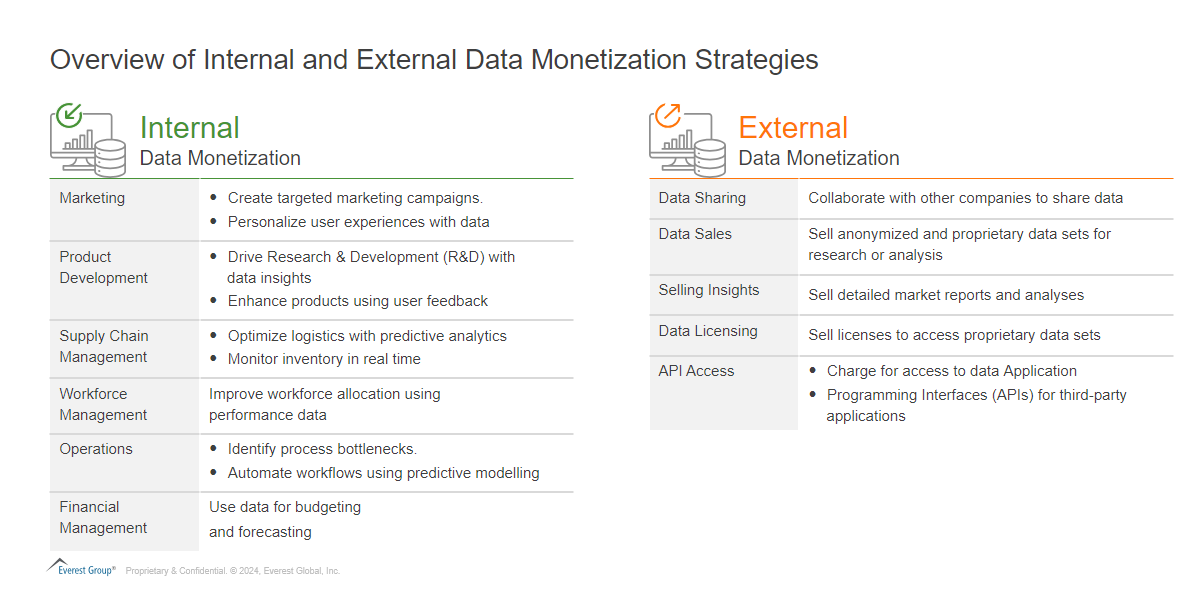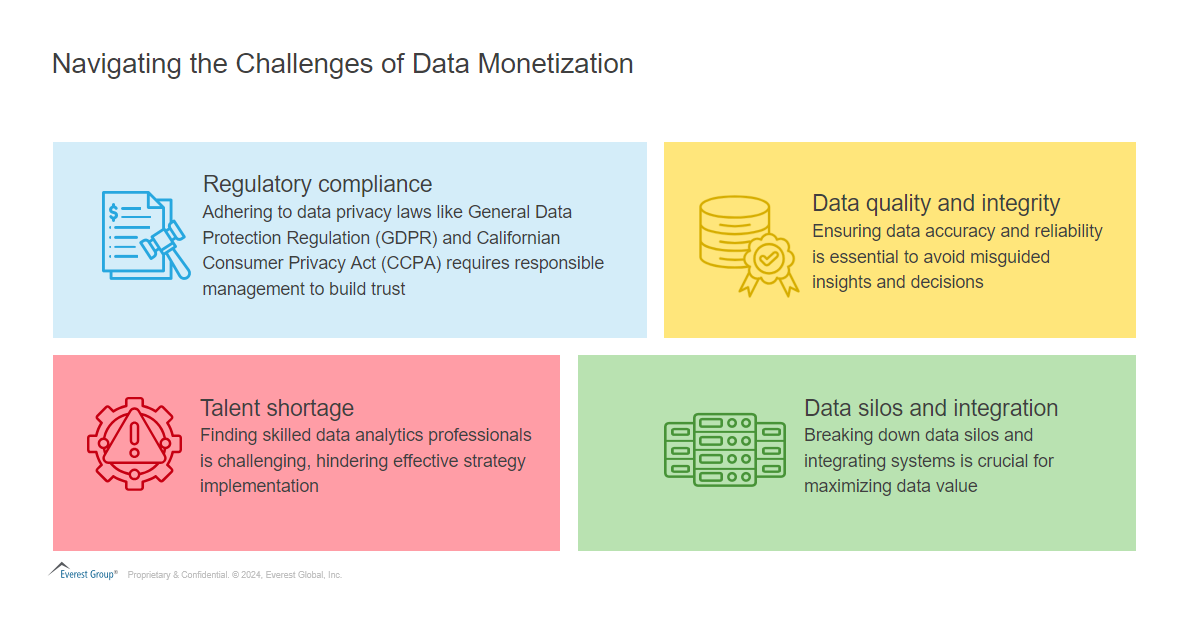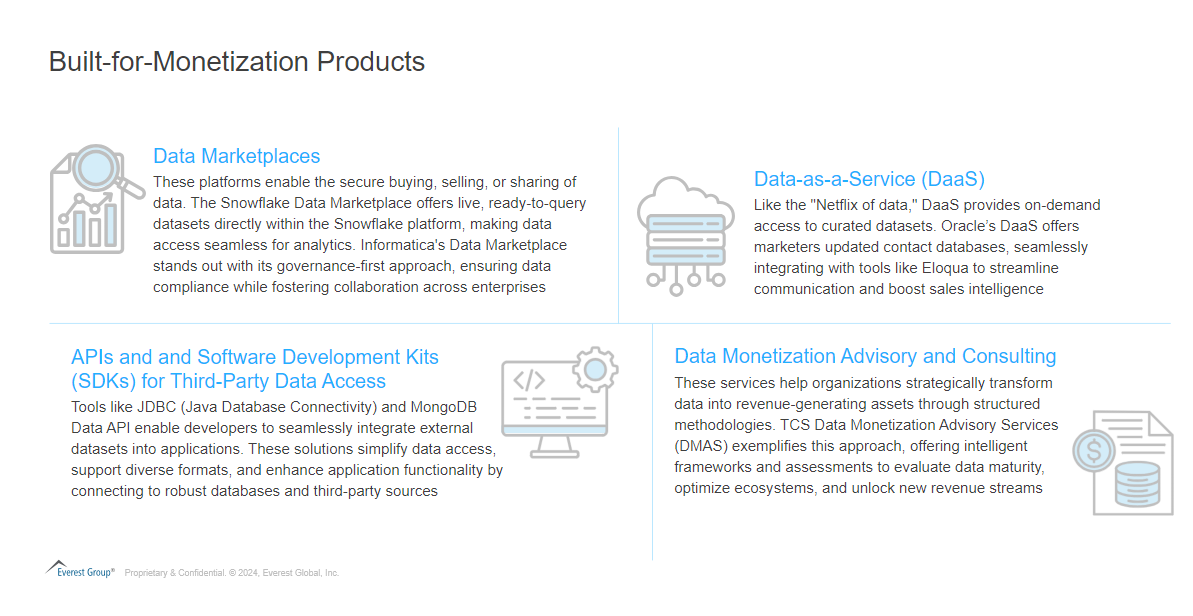Blog
Data Monetization - Show Me the Money

Unpacking Data Monetization: What’s the Real Value?
Data monetization is all about unlocking the hidden value within data. For many organizations, data has become one of their most valuable assets, and monetizing it can mean directly generating revenue, enhancing products, or driving smarter, data-informed decisions across every department. At its core, data monetization can be divided into internal and external applications. Internal data monetization is the process of using data to improve organizational functions for various departments. On the other hand, external data monetization is adopted in an organization, with the aim of making profits through selling the data to other partners or clients. Figure 1: Overview of Internal and External Data Monetization Strategies 
Industries Cashing in on Data Monetization
Data monetization has emerged as a game-changer across various sectors, benefiting specific functions significantly. In the energy sector, companies leverage data analytics to optimize supply chains and improve predictive maintenance. By analyzing consumption patterns, they can offer personalized energy solutions to customers, thus enhancing service offerings. For instance, Shell employs digital technology to improve customer services, predicting that digital tools will drive significant revenue growth by 2025. High-tech firms use data for product development and to improve customer experiences. They collect user behavior data to design customized software that meets customers’ needs and boosts satisfaction and loyalty. An example is Spotify, which uses user information to offer information to artists and advertising, which are new sources of revenue and improved user experience. In healthcare and life sciences, organizations harness data to enhance patient outcomes through personalized medicine and targeted treatments. By analyzing clinical data, they streamline operations while reducing costs. A good example of this is Johnson & Johnson who are incorporating data science in decision-making processes, while enhancing manufacturing and clinical trials. Retailers also use data monetization techniques to improve the customer experience and optimize inventory management. By analyzing purchasing behaviors, they can offer personalized promotions and adjust stock levels based on demand forecasting. Walmart’s Luminate platform employs customer information to assist suppliers in managing their stocks and enhances marketing strategies through data-driven recommendations.
Why Data Monetization Isn’t as Easy as It Looks
Unlocking the value of data can be challenging. Many organizations find themselves grappling with various challenges that can impede their progress. Understanding these obstacles is key to navigating the complex landscape of data monetization, enabling companies to harness their data effectively and drive meaningful business outcomes. Figure 2: Navigating the Challenges of Data Monetization 
A Slew of Products and Services Cater to Rising Data Monetization Needs
As organizations recognize the immense value locked within their data, the demand for innovative products and services catering to data monetization has surged. From foundational tools to emerging technologies, the market offers a range of solutions to help businesses monetize data effectively. Below, we explore the key categories driving this evolution. Figure 3: Built-for-Monetization Products  Traditional services enabling data monetization focuses on converting raw data into economic value and actionable outcomes. The key foundational categories include:
Traditional services enabling data monetization focuses on converting raw data into economic value and actionable outcomes. The key foundational categories include:
- Data acquisition
- Data storage and management
- Data processing and enrichment
- Analytics and insights generation
- Privacy, compliance, and governance
Among these, enterprise data management and modernization see the highest adoption. It is followed by analytics and insights generation. Data governance and privacy ensures regulatory compliance and the trustworthiness of data. Emerging services are changing the game for data monetization, making it easier for businesses to turn their data into revenue. Data vectorization converts complex information like text or images into numerical vectors, which tools like Pinecone use to power lightning-fast searches and personalized recommendations in industries like e-commerce. Meanwhile, synthetic data generation, with platforms like Mostly AI, creates realistic, privacy-safe datasets that are suitable for training artificial intelligence (AI) models, such as fraud detection in finance. These technologies are unlocking new ways to monetize data while staying scalable and compliant. Data monetization thrives on a synergy between innovative products and foundational services. While advanced tools unlock revenue opportunities, traditional services like data governance, processing, and strategy form the backbone of monetization efforts.
The Path Forward
As we progress in the data-driven era, the potential for data monetization is expanding rapidly. Apart from traditional use cases, Large Language Models (LLMs) have amplified the benefits that can be derived from enterprise data. Getting data monetization right has never been more impactful. Whether it be for internal use cases to improve enterprise decision-making or for creating new data-related revenue streams, data monetization as a pursuit is increasingly offering tangible benefits to Return on Investment (ROI) conscious business leaders. If you found this blog interesting, check out our blog focusing on Race For Artificial Intelligence (AI) Infrastructure: Navigating The Best Path To Supercharge Your AI Strategy | Blog – Everest Group, which delves deeper into another topic in the Data, Automation and AI service line. If you have any questions or would like to delve deeper into topics relating to Data, Automation and AI, please contact Shreeya Deshpande ([email protected])